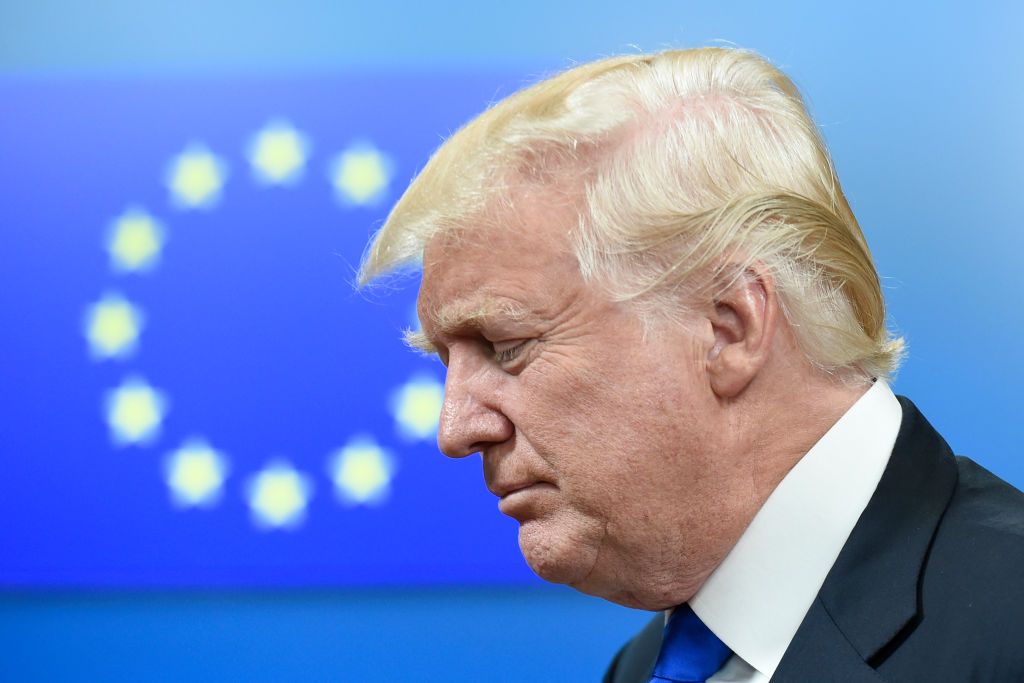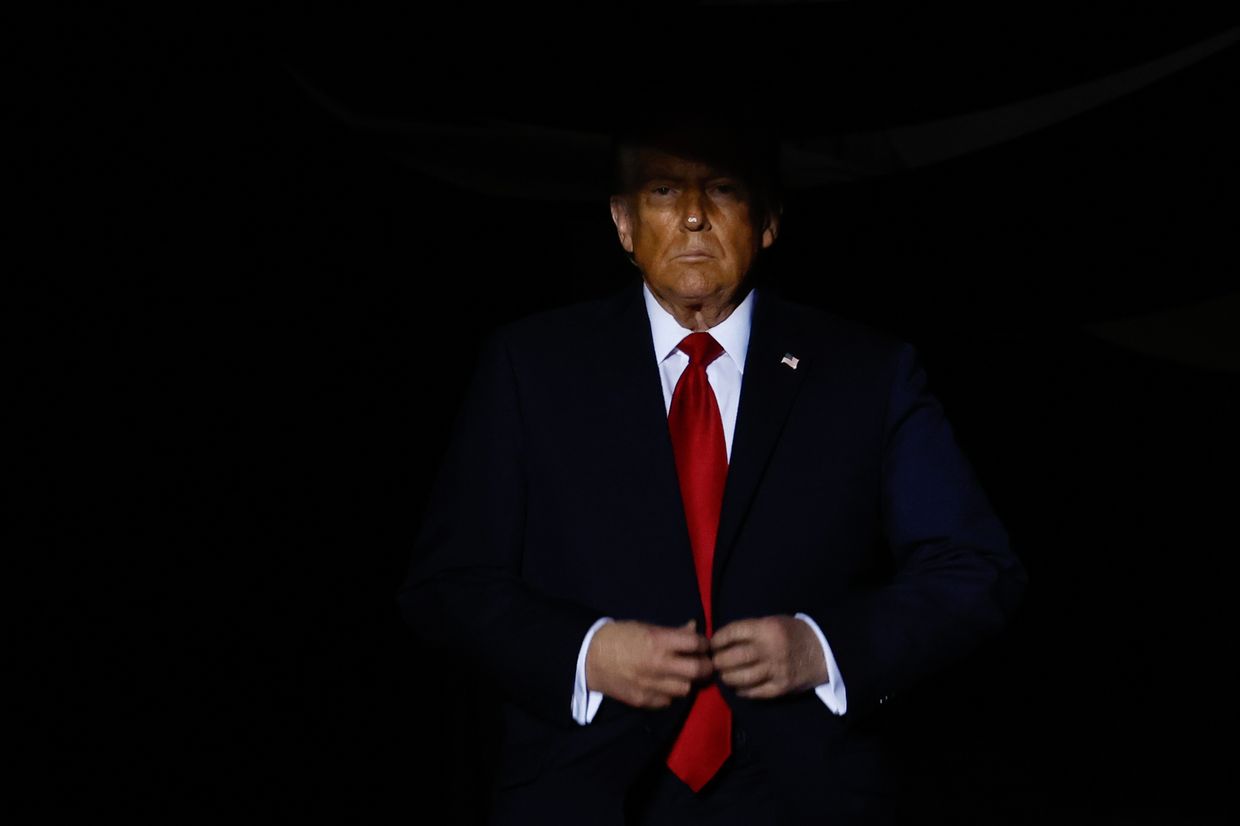Opinion: With Trump back, Europe can’t afford to guess on sanctions against Russia
Europe’s sanctions resolve faces a test under Trump — now’s the time for Europe to lead, not follow.

U.S. President-elect Donald Trump attends a gala at Mar-a-Lago in Palm Beach, Florida, U.S., on Nov. 14, 2024. (Joe Raedle/Getty Images)
The implications of Donald Trump’s imminent return to the White House on Russia’s illegal war in Ukraine are being minutely dissected. Will he deliver on his boast that he can end the war within 24 hours? How will he do that — if he can? At what cost to the long-suffering citizens of Ukraine? And how should Ukraine’s European allies anticipate and respond to whatever the new president — with all his unpredictability — chooses to do?
One area that will inevitably draw attention in any future Trump strategy on Ukraine is the continued imposition and enforcement of sanctions on Russia’s ability to fund and resource its full-scale invasion. What might we expect, and how should Ukraine and its European allies prepare?
The first important point to note is that Trump is no stranger to sanctions and other coercive economic tools of statecraft. During his first presidency, he used sanctions aggressively against Iran, pulling the United States out of the Iran nuclear deal (the Joint Comprehensive Plan of Action), which provided some nuclear-related sanctions relief for Iran, and doubled down on sanctions in his “maximum pressure” campaign against Tehran. Other countries, such as Venezuela and North Korea, also saw an uptick in U.S. sanctions. Of course, Trump’s addiction to tariffs was also on display.
Second, Trump’s love of deals, his desire to win and not appear weak, and his obsession with “value for money” for the American people are likely to play an important role in his future use of sanctions on Russia. Based on these criteria, it is not certain that, even if he could roll back sanctions on Russia, he necessarily would. For the U.S., sanctions on Russia are an almost costless tool given the limited connection between the U.S. and Russian economies; imposing sanctions allows Trump to look tough and support his drive for whatever deal he wants to secure with the Kremlin.
Third, the U.S. legislative landscape may hamper his ability to lift sanctions unilaterally. For example, the 2017 Countering America’s Adversaries Through Sanctions Act (CAATSA) places certain restrictions on the president’s ability to lift sanctions on Russia — something Trump acknowledged during his previous term in the White House, noting that signing CAATSA into law would restrict his ability “to strike good deals” for the American people.
But whatever transpires, European nations must assume that the transatlantic coordination and collaboration that has worked so well on the design, implementation, and enforcement of sanctions on Russia since February 2022 may not continue.
So, what should Brussels and London do?
The first point to acknowledge is that across Europe, the commitment to sanctions against Russia remains strong, despite nearly three years of effort. The lessons from 2014 have been learned. As European Commission President Ursula von der Leyen noted in an address to the Verkhovna Rada in November 2023, “we shall not repeat the mistakes of 2014. And we will continue to apply maximum pressure against Russia, until the end of the aggression, until Ukraine has re-established a just peace.”
As von der Leyen begins a new term as Commission president, with key sanctions staff such as EU Sanctions Envoy David O’Sullivan still in place, and with Poland taking on the presidency of the Council of the EU from January 2025, there is no doubt that the EU’s commitment to sanctions will remain visible and strong. The same is true of the new government in London, where Sir Keir Starmer and his foreign secretary see cross-channel collaboration on sanctions as a key opportunity for rapprochement with Brussels.
But rhetoric will not, by itself, suffice. Despite the scale of sanctions imposed on Russia, spiraling inflation, and an overheating economy, the Kremlin continues to secure the funding and resources it needs. With this in mind, and particularly if the U.S. becomes an unreliable partner, Europe needs to learn from Washington and adopt a far more muscular approach to its application of sanctions, leveraging its extensive trade relations with third countries and the use of the euro and pound sterling.
This will require Europe to accelerate its domestic enforcement efforts and ensure the sanctions criminalization directive is swiftly enacted and enforced. It will also require diplomatic dialogue with third countries facilitating circumvention, balanced with jeopardy for those countries — and, importantly, their private sector actors — that choose to continue to fund and resource Russia’s military. Finally, it calls for a more proactive, intelligence-led mindset among those charged with ensuring sanctions effectiveness.
Europe has had three years to get match-fit on sanctions, and while the application of sanctions may be a marathon, not a sprint, changes in the White House mean that Europe can no longer jog behind Uncle Sam. It’s time for Europe to shed its timidity and show what it has learned. Anything less will be a betrayal of the Ukrainian people at a time when they need Europe more than ever.
Editor’s Note: The opinions expressed in the op-ed section are those of the authors and do not necessarily reflect the views of the Kyiv Independent.













